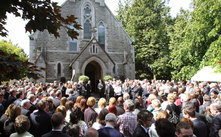
Why an Irish funeral trumps everything
At 9 am this morning, I got a note from a neighbour telling me that Vera from across the road had died suddenly and the funeral was at 10 am. So at 10 am, I was at a funeral mass with several hundred others, in my best sober shirt and tie.
I’d known Vera distantly for 15 years and spoken to her (weather only) maybe a dozen times. She seemed a perfectly nice person, with a passion for her front garden, but I never got to know her in any but the most superficial way.
So why did I drop everything at twenty minutes notice and hare off to her funeral? Because in Ireland a funeral trumps everything.
The country still operates in a forest of mutual obligations, of favours given, owed and received – the “round” system, which notoriously forces everyone in a group in an Irish pub to buy a drink for everyone else, is only the most egregious example. And funerals are probably the most important mutual obligation of all.
A large network of mutual obligations“I’ll go to your funeral if you come to mine”? A bit too Irish. No, the duty is to the survivors, the extended family and friends, other neighbours, the entire network of connections that allows us to recognise each other: kin, in the very broadest sense. Being there certainly conveys solidarity with the bereaved, but it also reconfirms membership in that broader group for everyone who attends.
A twenty-five-year in memoriam notice, published in 1972One result is that records of funerals are uniquely important in Ireland. Visitors can be bewildered at the half-hour-long lists of deaths and funeral arrangements that constitute prime-time broadcasting on local radio. One of the most visited Irish websites is rip.ie, providing a country-wide database of funerals. Newspapers still have full pages of “the deaths”.
And all of these include lists of immediate family, in-laws and grandchildren, with addresses, cemeteries, places of origin … everything needed for family history. When I looked up Vera’s death notice on rip.ie after coming home from the funeral, I found out more about her than in the fifteen years of being her neighbour.
At 9 am this morning, I got a note from a neighbour telling me that Vera from across the road had died suddenly and the funeral was at 10 am. So at 10 am, I was at a funeral mass with several hundred others, in my best sober shirt and tie.
I’d known Vera distantly for 15 years and spoken to her (weather only) maybe a dozen times. She seemed a perfectly nice person, with a passion for her front garden, but I never got to know her in any but the most superficial way.
So why did I drop everything at twenty minutes notice and hare off to her funeral? Because in Ireland a funeral trumps everything.
The country still operates in a forest of mutual obligations, of favours given, owed and received – the “round” system, which notoriously forces everyone in a group in an Irish pub to buy a drink for everyone else, is only the most egregious example. And funerals are probably the most important mutual obligation of all.
A large network of mutual obligations“I’ll go to your funeral if you come to mine”? A bit too Irish. No, the duty is to the survivors, the extended family and friends, other neighbours, the entire network of connections that allows us to recognise each other: kin, in the very broadest sense. Being there certainly conveys solidarity with the bereaved, but it also reconfirms membership in that broader group for everyone who attends.
A twenty-five-year in memoriam notice, published in 1972One result is that records of funerals are uniquely important in Ireland. Visitors can be bewildered at the half-hour-long lists of deaths and funeral arrangements that constitute prime-time broadcasting on local radio. One of the most visited Irish websites is rip.ie, providing a country-wide database of funerals. Newspapers still have full pages of “the deaths”.
And all of these include lists of immediate family, in-laws and grandchildren, with addresses, cemeteries, places of origin … everything needed for family history. When I looked up Vera’s death notice on rip.ie after coming home from the funeral, I found out more about her than in the fifteen years of being her neighbour.
 RSS Feed
RSS Feed